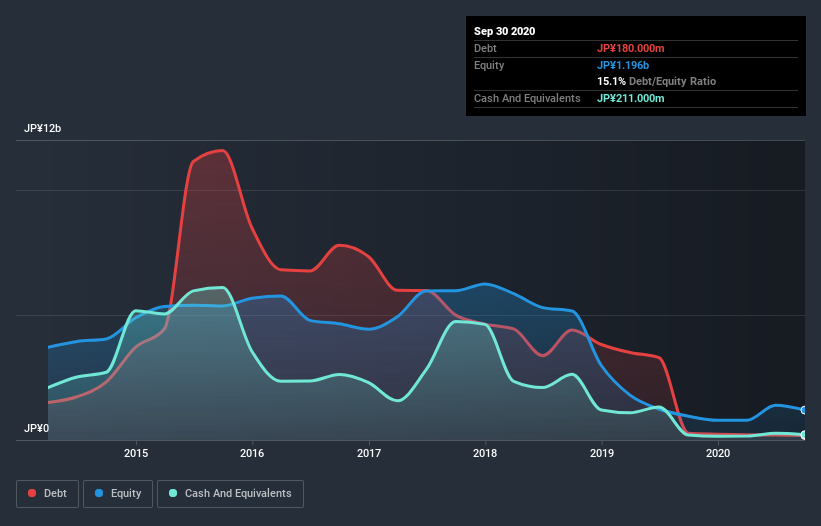Howard Marks put it nicely when he said that, rather than worrying about share price volatility, 'The possibility of permanent loss is the risk I worry about... and every practical investor I know worries about.' When we think about how risky a company is, we always like to look at its use of debt, since debt overload can lead to ruin. We note that Fisco Ltd. (TYO:3807) does have debt on its balance sheet. But the real question is whether this debt is making the company risky.
When Is Debt A Problem?
Debt and other liabilities become risky for a business when it cannot easily fulfill those obligations, either with free cash flow or by raising capital at an attractive price. Part and parcel of capitalism is the process of 'creative destruction' where failed businesses are mercilessly liquidated by their bankers. However, a more frequent (but still costly) occurrence is where a company must issue shares at bargain-basement prices, permanently diluting shareholders, just to shore up its balance sheet. Of course, plenty of companies use debt to fund growth, without any negative consequences. When we think about a company's use of debt, we first look at cash and debt together.
View our latest analysis for Fisco
What Is Fisco's Net Debt?
The image below, which you can click on for greater detail, shows that Fisco had debt of JP¥180.0m at the end of September 2020, a reduction from JP¥273.0m over a year. But on the other hand it also has JP¥211.0m in cash, leading to a JP¥31.0m net cash position.

How Healthy Is Fisco's Balance Sheet?
Zooming in on the latest balance sheet data, we can see that Fisco had liabilities of JP¥276.0m due within 12 months and liabilities of JP¥1.16b due beyond that. Offsetting this, it had JP¥211.0m in cash and JP¥141.0m in receivables that were due within 12 months. So it has liabilities totalling JP¥1.08b more than its cash and near-term receivables, combined.
Given Fisco has a market capitalization of JP¥9.00b, it's hard to believe these liabilities pose much threat. Having said that, it's clear that we should continue to monitor its balance sheet, lest it change for the worse. Despite its noteworthy liabilities, Fisco boasts net cash, so it's fair to say it does not have a heavy debt load! When analysing debt levels, the balance sheet is the obvious place to start. But you can't view debt in total isolation; since Fisco will need earnings to service that debt. So when considering debt, it's definitely worth looking at the earnings trend. Click here for an interactive snapshot.
In the last year Fisco had a loss before interest and tax, and actually shrunk its revenue by 88%, to JP¥1.0b. To be frank that doesn't bode well.
So How Risky Is Fisco?
We have no doubt that loss making companies are, in general, riskier than profitable ones. And the fact is that over the last twelve months Fisco lost money at the earnings before interest and tax (EBIT) line. Indeed, in that time it burnt through JP¥38m of cash and made a loss of JP¥255m. Given it only has net cash of JP¥31.0m, the company may need to raise more capital if it doesn't reach break-even soon. Summing up, we're a little skeptical of this one, as it seems fairly risky in the absence of free cashflow. The balance sheet is clearly the area to focus on when you are analysing debt. But ultimately, every company can contain risks that exist outside of the balance sheet. Consider for instance, the ever-present spectre of investment risk. We've identified 4 warning signs with Fisco (at least 1 which can't be ignored) , and understanding them should be part of your investment process.
At the end of the day, it's often better to focus on companies that are free from net debt. You can access our special list of such companies (all with a track record of profit growth). It's free.
When trading Fisco or any other investment, use the platform considered by many to be the Professional's Gateway to the Worlds Market, Interactive Brokers. You get the lowest-cost* trading on stocks, options, futures, forex, bonds and funds worldwide from a single integrated account. Promoted
New: AI Stock Screener & Alerts
Our new AI Stock Screener scans the market every day to uncover opportunities.
• Dividend Powerhouses (3%+ Yield)
• Undervalued Small Caps with Insider Buying
• High growth Tech and AI Companies
Or build your own from over 50 metrics.
This article by Simply Wall St is general in nature. It does not constitute a recommendation to buy or sell any stock, and does not take account of your objectives, or your financial situation. We aim to bring you long-term focused analysis driven by fundamental data. Note that our analysis may not factor in the latest price-sensitive company announcements or qualitative material. Simply Wall St has no position in any stocks mentioned.
*Interactive Brokers Rated Lowest Cost Broker by StockBrokers.com Annual Online Review 2020
Have feedback on this article? Concerned about the content? Get in touch with us directly. Alternatively, email editorial-team (at) simplywallst.com.
About TSE:3807
Slight risk not a dividend payer.
Market Insights
Community Narratives




